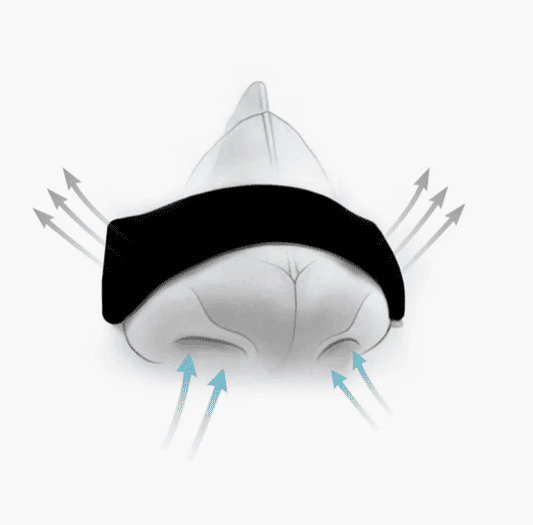Have you ever been self-conscious about an annoying whistling sound coming from your nose when you breathe? You’re not alone! Nose whistle, medically known as stridor, is a surprisingly common occurrence.
An interesting statistical analysis explains how breathing sounds change based on a person’s age, position, how they breathe, and where the sounds are recorded on the body. For instance, it shows whistling sounds are more common during inhalation in children than in adults!
While occasional whistling might not be a cause for concern, persistent loud nasal breathing can indicate underlying issues. This guide will delve into the reasons behind a whistling nose and explore solutions for quieter breathing.
Common Causes And Symptoms of Loud Nasal Breathing

Loud nasal breathing, also known as noisy breathing, can be disruptive to both yourself and those around you. Here are some of the main factors contributing to it, along with some common symptoms:
- Nasal congestion. Blocked nasal passages can lead to audible breathing through the nose, snoring, and mouth breathing, resulting in dry mouth upon waking and sleep disturbances.
- Deviated septum. A crooked septum can obstruct airflow, causing noisy breathing and potentially contributing to snoring and mouth breathing, leading to daytime fatigue and frequent awakenings.
- Enlarged turbinates. Swollen nasal turbinates can obstruct airflow, resulting in audible breathing and potentially snoring, mouth breathing, and reduced sense of smell.
- Allergic rhinitis. Inflamed nasal passages due to allergies can cause noisy breathing, snoring, and mouth breathing, often leading to sleep disturbances and daytime fatigue.
- Nasal polyps. Growths in the nasal passages can obstruct airflow, causing loud nasal breathing and potentially contributing to snoring, mouth breathing, and sleep disturbances.
- Chronic sinusitis. Persistent inflammation of the sinuses can lead to nasal congestion, resulting in audible breathing and potentially snoring, mouth breathing, and reduced sense of smell.
- Obesity. Excess weight can lead to fat deposits around the neck, which can obstruct the airway during sleep, contributing to loud nasal breathing and potentially leading to sleep apnea.
- Sleep apnea. Obstructive sleep apnea can cause loud snoring and mouth breathing, leading to frequent awakenings, daytime fatigue, and reduced sense of smell.
- Enlarged adenoids or tonsils. Swollen adenoids or tonsils can obstruct the airway, resulting in noisy breathing and potentially contributing to snoring, mouth breathing, and sleep disturbances.
- Structural abnormalities. Other anatomical issues, such as narrow nasal passages or a large tongue, can lead to noisy nasal breathing and may cause snoring, mouth breathing, and sleep disturbances.
6 Solutions to Silence the Nose Whistle when Breathing
From nasal strips to surgical options, multiple effective solutions can address noisy breathing. Understanding the cause of the annoying whistling nose enables prompt resolution, with most solutions chosen based on the underlying issue. Let’s explore the diverse approaches to resolving the problem of loud nasal breathing.
1. Nasal Strips

Nasal strips work by gently lifting the sides of the nose, which helps to open up the nasal passages and improve airflow. This widening of the airways can reduce the resistance to airflow, making it easier to breathe through the nose and reducing the likelihood of noisy breathing, such as snoring or whistling.
By promoting nasal breathing over mouth-breathing, nasal strips can also help to prevent dry mouth and throat irritation, further contributing to a quieter and more comfortable night’s sleep. Here are the best nose strips that you can opt for to breathe better, naturally.
Using nasal strips can provide a simple and effective way to address nasal congestion and reduce nasal noise, leading to better sleep quality and overall respiratory wellness.
2. Nasal Irrigation Benefits
Nasal irrigation is like a refreshing shower for your nose, offering a host of benefits for clearing blockages and quieting those annoying nasal sounds. By rinsing out excess mucus and allergens, it helps ease congestion and soothe inflammation in your nasal passages. This can lead to easier breathing and less noisy nose moments, like snoring or whistling.
Plus, nasal irrigation helps keep your nose moisturized, preventing dryness and making breathing even quieter. So, next time your nose feels stuffy or noisy, consider giving it a gentle rinse to enjoy clearer, quieter breathing all day long.
3. Managing Your Allergy
Taking charge of your allergies plays a crucial role in quieting those pesky nasal noises. By identifying and avoiding triggers like pollen or pet dander, you can minimize inflammation in your nasal passages. This reduces congestion and makes breathing quieter and more comfortable.
Using allergy medications or nasal sprays as directed by your healthcare provider can further help control symptoms and keep nasal noise at bay. With proactive allergy management, you can enjoy clearer breathing and quieter days, free from the annoyance of nasal congestion and noise.
4. Decongestants’ Role
When it comes to quieting nasal congestion and noise, decongestants step in as the ultimate helpers. They shrink swollen blood vessels in your nasal passages, clearing the way for better airflow and less congestion. As a result, you’ll notice those annoying nasal sounds, like snoring or wheezing, start to fade away.
But remember, always use decongestants responsibly and follow your healthcare provider’s advice to avoid any unwanted side effects.
5. Humidifiers for Nasal Health
Ensuring the right humidity levels is key to nasal health. Dry air can cause discomfort, congestion, and nosebleeds. Humidifiers add moisture, soothing nasal passages and reducing dryness. This alleviates noisy breathing by easing irritation.
Optimal humidity is the ideal moisture level in the air that promotes comfort and health, typically ranging between 30% to 50%. It keeps nasal passages moist, aiding clear breathing. Plus, humidifiers help thin mucus, making it easier to clear.
6. Effective Breathing Exercises
While addressing the cause of noisy breathing is key, exercises can help train your body for optimal nasal breathing:
- Alternate Nostril Breathing: Close one nostril, inhale deeply through the other, hold, then switch and exhale. Repeat, alternating sides. This promotes nasal passage balance.
- Pursed-Lip Breathing: Inhale slowly through your nose, purse your lips, and exhale slowly through them. This slows breathing rate and promotes nasal airflow.
- Belly Breathing: Lie down, and place a hand on your stomach. Breathe deeply, feeling your belly rise and fall, not your chest. This promotes diaphragmatic breathing, aiding nasal function.
These exercises, practiced regularly, can strengthen your nasal passages and reduce noisy breathing. To learn why you should breathe through your nose, read our comprehensive blog post.
Surgical Solutions (Sinuplasty)
Surgery may be considered if conservative treatments like medication and breathing exercises haven’t provided relief from structural problems causing noisy breathing.
Sinuplasty, a minimally invasive procedure, can remove nasal polyps blocking the nasal passages. Other options could be turbinate reduction surgery to shrink enlarged turbinates, Septoplasty for deviated septum, or surgeries to correct specific anatomical issues impacting airflow.
Lifestyle Changes to Eliminate Whistling

Here are some lifestyle changes that can promote quieter nasal breathing, reducing whistling sounds:
- Manage allergies and irritants: Allergies and irritants like dust can inflame nasal passages, reducing airflow. Manage them with medication or air purifiers.
- Hydrate: Adequate hydration keeps nasal passages moist, preventing congestion and noisy breathing.
- Reduce stress: Stress and facial tension can constrict nasal passages. Try relaxation techniques like meditation or naturally relieving tension in face.
- Nasal breathing exercises: Regularly practice exercises like alternate nostril breathing to strengthen and open nasal passages.
- Elevate your head during sleep: This improves drainage and airflow, reducing congestion and whistling.
When to Consult Your Healthcare Provider
See a healthcare provider if you experience:
- Persistent noisy breathing, especially at night, disrupting your sleep.
- Difficulty breathing through your nose, even after trying home remedies like nasal saline irrigation.
- Facial pain or pressure around your nose and forehead.
- Frequent nosebleeds.
- Fever or foul-smelling discharge from your nose.
- Significant daytime fatigue due to poor sleep.
Early diagnosis and treatment can help address the underlying cause of noisy breathing and prevent complications.
Additional Tips for Reducing Wheezing
Here are some extra tips to reduce wheezing and improve nasal breathing:
- Identify and avoid irritants: Smoke, dust, and strong fumes can inflame nasal passages. Try using an air purifier at home.
- Adjust your sleep position: Elevate your head with extra pillows to improve drainage and airflow.
- Nasal valve dilators: These small, spring-like devices inserted gently into your nostrils can help keep nasal passages open, especially at night.
- Regularly perform sinus pressure exercises: These exercises can help move mucus and improve drainage, naturally relieving congestion. Learn safe and effective exercise to relieve sinus pressure

Long-Term Strategies for Sinus Health
Ensuring long-term sinus health requires continuous care and maintenance. Firstly, prioritize proper hydration to keep nasal passages moist and clear. Regularly irrigate sinuses with saline solutions to flush out irritants and mucus buildup naturally. Steam inhalation or warm compresses are the best ways to sleep with stuffy nose as they help alleviate congestion and promote easier breathing.
Invest in a quality air purifier to minimize exposure to allergens and pollutants. Furthermore, adopt healthy sleep habits, such as sleeping with an elevated head or using nasal strips to improve airflow and reduce nasal noise. By consistently implementing these strategies, you can achieve lasting relief from nasal issues and maintain optimal sinus health naturally.

Harmonizing Your Breathing
Loud nasal breathing can be disruptive and frustrating. This guide has equipped you with tools to tackle the issue. Remember, a holistic approach is key. For immediate relief, address the cause. Try decongestants for allergies, saline irrigation for congestion, or breathing exercises to strengthen nasal passages. Focus on healthy habits is the long-term solution. Manage allergies, stay hydrated, and prioritize sleep hygiene. Consider natural solutions like humidifiers and stress management techniques. By combining immediate solutions with long-term strategies, you can harmonize your breathing and experience lasting relief from noisy nights.



